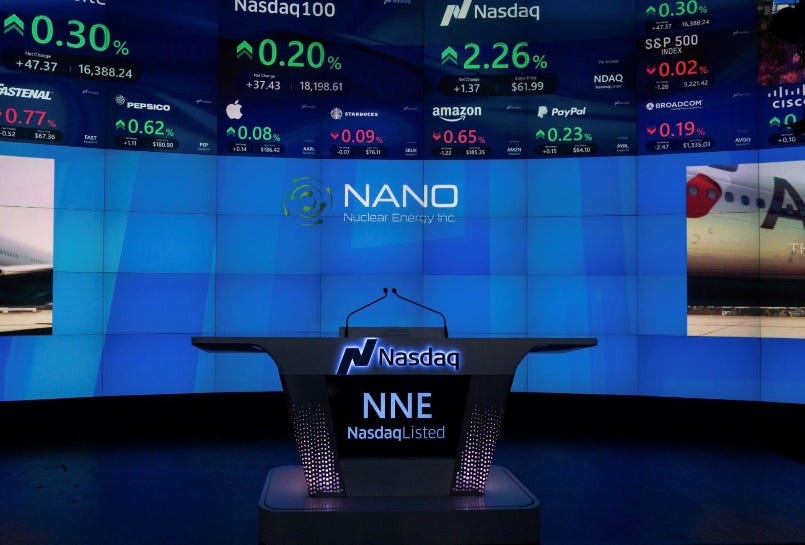Nano Nuclear Energy Faces Dilution Risks as Public Float Expands 16 Percent in PIPE Deal
Nano Nuclear Energy Inc. (NNE) on May 26, 2025 agreed to sell 3.9 million shares to six institutional investors in a private investment in public equity (PIPE) at $27.00 per share, representing a 10% discount to NNE's closing price on May 25, 2025. In addition, the company agreed to file a registration statement for the newly issued shares no later than June 10, 2025. Once the SEC declares the registration effective—typically within one to two weeks—the six investors can begin selling the shares into the market.
The 3.9 million shares will increase the supply of publicly traded NNE shares by about 16%, which could put noticeable downward pressure on the share price. Indeed, the stock fell 16% last week as the market adjusted for the potential effects of the PIPE. Nevertheless, NNE closed at $30.13 per share on Friday—still 10% above the price paid by the six investors.
Only six months earlier, Nano raised $60 million from three institutional investors in a separate PIPE, in which it sold 2.5 million shares and 2.5 million accompanying warrants at a combined price of $24 per share. The SEC declared registration of the shares effective on January 24, 2025. The warrants were exerciseable upon issuance at $26 per share and remain exerciseable for five years.
Nano has been a public company for slightly over a year, during which it has issued a remarkable amount of equity while its stock price has increased 737%. In May 2024, it netted $9 million in an initial public offering (IPO) of 2.6 million shares at $4.00 per share. Two months later, it sold 900,000 shares bundled with warrants at $20.00 per unit. In Oct. 2024, it issued another 2.1 million units at $17 a piece.
During the six months ended Mar. 31, 2025, Nano received $14.4 million from the exercise of warrants, making warrant exercises a significant source of cash for the company—and a significant contributor its public float, which has ballooned more than sevenfold since the IPO to 24.5 million shares. As of Mar. 31, 2025, Nano still had 3.5 million warrants outstanding with a weighted average exercise price of $23.86 per share and a weighted average term of 4.6 years.
The $26 exercise price of the November 2024 warrants is a key dilution threshold to watch. The chart below shows that dilution pressure has coincided with the stock trading above $26. During such periods, relative strength index (RSI) values have frequently risen above 70 and then reversed, indicating heavy selling into overbought conditions. MACD crossovers can serve as entry and exit signals for trades during these dilution-sensitive periods.
As of Marc 31, 2025, Nano was sitting on a cash horde of $118.6 million—the spoils of its multiple public and private offerings. But make no mistake: the company will sell more shares in the near term. Nano has never generated revenue, does not anticipate generating revenue for several years, and relies entirely on the capital markets for financing. During the six months ended March 31, 2025, the company burned through $5.6 million for operations and sank $12.7 million into research and development and fixed assets. Management has stated that Nano intends to file a universal shelf registration so it can tap the capital markets at will.
The plaintiffs' bar took notice of Nano soon after its Nasdaq debut. The company is a defendant in a shareholder class-action lawsuit filed in August 2024 in U.S. District Court for the Southern District of New York. The latest amended complaint references a July 2024 report by Hunterbrook Media, which states that Nano's executive chairman and president, CEO, and CFO work as independent contractors for Nano while holding senior management positions at various penny-stock companies. The report further states that Nano appears to have filed no permitting or regulatory application documents with the U.S. Nuclear Regulatory Commission despite management's claims to the contrary.
Investors have been aware of the risks related to Nano's fundamentals for over a year. Less understood are the effects of the company's ongoing issuances of shares. We believe the stock's undoing will be float bloat.






